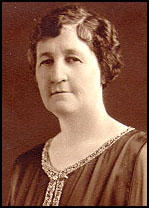Miram Ferguson

Miriam Wallace was born in Bell County, Texas, on 13th June, 1875. She was educated at Salado College and Baylor College.
In 1899 she married James Ferguson, a lawyer from Belton. Ferguson was also involved in real estate and insurance and later turned his attention to banking. In 1907 Ferguson helped to establish the Temple State Bank.
A member of the Democratic Party, Ferguson took a keen interest in politics and in 1914 was elected as governor of Texas. During his period of office he began a policy of state aid to rural schools tried to make attendance at school compulsory. This increased spending on education resulted in the tax rate in Texas being increased from 12½ to 30 cents.
In 1916 Ferguson was reelected as governor. He continued with his policy of increased education spending and the tax rate reached the constitutional maximum of thirty-five cents. However, on 21st July, 1917, Ferguson appeared before the Travis County grand jury, and indicted on nine charges. Seven of the charges related to misapplication of public funds, one to embezzlement, and one to the diversion of a special fund. The Court of Impeachment, by a vote of twenty-five to three, removed Ferguson from office and made him ineligible to hold any office in the state of Texas.
In 1924, with her husband unable to stand, Miriam Ferguson decided to run for governor. Her opponent, Felix Robertson, was endorsed by the Ku Klux Klan. Ferguson defeated Robertson and in November, 1924, defeated the Republican Party candidate and therefore became the first woman governor of Texas. She was the second woman governor in United States history, Nellie Ross, having won in Wyoming a few days earlier.
Ferguson attempt at securing an anti-mask law against the Ku Klux Klan was passed but it was overturned by the courts. She also caused controversy by pardoning an average of 100 convicts a month. It was claimed that this was as a result of bribes being paid. Ferguson was also accused of granting road contracts in return for lucrative kickbacks. Although this was never proved, it resulted in her being defeated by James Moody in 1926.
Ferguson stood again in 1930 but was defeated by Ross Sterling. At this time the major oil producers in Texas were concerning about the fall in price of oil. The Texas Railroad Commission, under the control of these companies, attempted to limit the production of oil (prorationing) in the new fields of East Texas. On 31st July, 1931, the federal court in Houston sided with a group of independent oil producers and ruled that the Texas Railroad Commission had no right to impose prorationing.
Large oil companies in Texas such as Humble Oil were in favour of prorationing and Sterling came under great pressure to intervene. On 16th August, 1931, Sterling declared martial law in Rusk, Upshur, Gregg and Smith counties. In his proclamation Sterling declared that the independent oil producers in these counties were "in a state of insurrection" and that the "reckless and illegal exploitation of (oil) must be stopped until such time as the said resources may be properly conserved and developed under the protection of the civil authorities".
Ross Sterling now ordered the commander of the Texas National Guard, Jacob F. Wolters, to "without delay shut down each and every producing crude oil well and/or producing well of natural gas". Wolters who was the chief lobbyist of several major oil companies in Texas, readily agreed to this action. Wolters used more than a thousand troops to make sure that the oil wells in East Texas ceased production. The Texas Railroad Commission was now in firm control of the world's most prolific oil fields. It now controlled the supply of the oil in the United States. As a result, the price of oil began to increase.
The courts ruled that Sterling had exceeded his authority by the declaration of martial law and he was easily defeated by Ferguson when he attempted to be the Democratic Party nominee in 1932. Ferguson went on to defeat the Republican Party candidate, Orville Bullington.
Ferguson's second term was less controversial than her first period in office. However, her attempts to introduce a state sales tax and corporate income tax were rejected by the state legislature. She continued to parson criminals but as this reduced the amount of money being spent on the prison system, this time it created little criticism.
In 1934 Ferguson retired from politics. However, she returned in 1940 with a radical programme of increasing funding for secondary and higher education, a social security for the elderly and support for the trade union movement. However, she was defeated by the right-wing candidate, Wilbert Lee O'Daniel.
Miriam Ferguson died of heart failure on 25th June, 1961
.

